- Home
- Joseph Conrad
Heart of Darkness and The Secret Sharer Page 2
Heart of Darkness and The Secret Sharer Read online
Page 2
In recent years, Joseph Conrad’s work, or more specifically, ideas of gender, race, class, and hegemony implicit in his work, have been severely criticized. The assumptions of Caucasian male privilege are no longer taken for granted among many readers. It should be acknowledged by Conrad’s admirers that the audience for whom he imagined his work was almost exclusively male, and assuredly Caucasian. To readers not in this category, the occasionally dogmatic and even derisive nature of certain of Marlow’s remarks will strike a discordant note:It’s queer how out of touch with truth women are. They live in a world of their own, and there never has been anything like it, and never can be. It is too beautiful altogether, and if they were to set it up it would go to pieces before the first sunset. Some confounded fact we men have been living contentedly with ever since the day of creation would start up and knock the whole thing over.
Leaving aside for the moment the improbability of an entire sex, and that the child-bearing sex, being permanently ‘‘out of touch with truth,’’ we might assume, for argument’s sake, that Marlow is speaking critically of a financially well-off, minimally educated class of women who, being denied the possibility of careers and any measure of autonomy apart from fathers, husbands, brothers, or sons, were kept in a perpetual state of childish dependence upon men—the ‘‘fact’’-bearing sex. In the gothic-melodramatic final scene of Marlow’s tale, in which he visits Kurtz’s fiancée, the very emblem of Victorian moral hypocrisy and delusion, Conrad’s misogyny is disguised by an air of pity and condescension; a full year after Kurtz’s ignoble death, his intended is still in mourning, a neurasthenic apparition in black, with ‘‘a pale head, floating towards me in the dusk. . . . She carried her sorrowful head as if she were proud of that sorrow.’’ The valiant Marlow, who detests lies, for lies are ‘‘tainted with death,’’ nonetheless ‘‘laid the ghosts of [Kurtz’s] gifts at last with a lie’’ by telling Kurtz’s intended that, at the end of Kurtz’s life, it was her name he uttered. (In fact, ironically, Kurtz’s last words were ‘‘The horror! The horror!’’) Men must lie to women, Conrad argues, to preserve women’s childlike state of delusion. In Conrad’s ranked moral universe, men of a certain class are custodians of truth, facts, ideas, and the respect for tradition outlined in the British Navy handbook An Inquiry into Some Points of Seamanship; women are associated with lies, subterfuge, hypocrisy. (Caucasian women, that is. For a portrait of a black woman, consider Marlow’s description of Kurtz’s native mistress, of whom Marlow speaks awkwardly as ‘‘barbarous’’— ‘‘savage and superb, wild-eyed and magnificent’’—with a face that communicates a ‘‘tragic and fierce aspect of wild sorrow and of dumb pain mingled with the fear of some struggling, half-shaped resolve’’—‘‘like the wilderness itself, with an air of brooding over an inscrutable purpose.’’ Words piled upon words, suggesting a generalized allegorical figure, a carved wooden sculpture symbolizing African Woman, and not a living, breathing individual woman who is supposed to be passionately in love with the dying Kurtz.)
Conrad has been criticized more sharply for his presentations of men and women of color. Consider Marlow’s astonishment and amusement when a black African emulates ‘‘white’’ behavior:I had to look after the savage who was fireman. He was an improved specimen; he could fire up a vertical boiler. . . . [T]o look at him was as edifying as seeing a dog in a parody of breeches and a feather hat, walking on his hind-legs. . . . [H]e had filed teeth, too, the poor devil, and the wool of his pate shaved into queer patterns, and three ornamental scars on each of his cheeks. He ought to have been clapping his hands and stamping his feet on the bank, instead of which he was hard at work, a thrall to strange witchcraft.
Elsewhere, African natives are ‘‘dusty niggers,’’ ‘‘surly niggers,’’ ‘‘cannibals.’’ Conrad, the moralist, the artist for whom prose fiction is a vocation like the priesthood,painfully reveals himself in such passages, and numerous others, as an unquestioning heir of centuries of Caucasian bigotry. Yet it might be argued that Marlow, for all his condescension, represents a degree of humanity not found in the other Caucasian Europeans who are intent upon wresting from black Africa all they can get. Marlow isn’t in the Congo for ivory, or money, or to advance his career; he takes on the captaincy of the steamboat for adventure’s sake, and becomes fascinated with the demonic figure of Kurtz, the very embodiment of European civilization. Marlow’s sharp, cinematic eye brings alive for us these suffering black men, whose plight is meant to move the hearts of Conrad’s educated, well-to-do English readers:Six black men advanced in a file, toiling up the path. . . . I could see every rib, the joints of their limbs were like knots in a rope; each had an iron collar on his neck, and all were connected together with a chain whose bights swung between them, rhythmically clinking. . . . [T]hese men could by no stretch of imagination be called enemies. They were called criminals. . . . They passed me within six inches, without a glance, with that complete, deathlike indifference of unhappy savages.
Other black men, enslaved and driven like animals until they are of no further use, are allowed to crawl off and die. Marlow is horrified by these ‘‘moribund shapes’’—‘‘phantoms’’—dying of exhaustion and malnutrition ‘‘as in some picture of a massacre or a pestilence. ’’ Yet we wait in vain for Marlow to protest to anyone, though he soon encounters the chief accountant of the station, an impeccably dressed and groomed Englishman. There is the suggestion in ‘‘Heart of Darkness, ’’ as elsewhere in Conrad’s work, of a pessimism so deeply entrenched as to be identical with a self-serving political conservatism that conveniently renders any form of activism, even protest, ineffective.
For if all men harbor darkness in their hearts, why try to save them? Why even pity them?
The famous tale ‘‘The Secret Sharer,’’ from Conrad’s collection ’Twixt Land and Sea (1912), similarly reflects the narrowness of its creator’s perspective. Here it is class, not sex or race, that determines a man’s worth: an immature young captain, uneasy in his responsibility, mysteriously protects a fugitive named Leggatt, who has fled another ship after having killed a man; the young captain goes to extraordinary, foolhardy risks to allow Leggatt to escape being brought back to England to be tried; by the end of the suspense story, with the flight of Leggatt, the equation between the two men, forged out of their similar backgrounds and temperaments, has been many times reiterated: Leggatt swims clear of the ship ‘‘as though he were my second self . . . a free man, a proud swimmer striking out for a new destiny.’’
The difficulty for contemporary readers of ‘‘The Secret Sharer,’’ which was one of Conrad’s favorites among his own stories, is that the bond immediately forged between the young captain and the young fugitive is class-ordained and narcissistic: Leggatt has even attended the captain’s school, Conway (‘‘You’re a Conway boy?’’). Leggatt’s act of violence is portrayed as a virtuous act by an upstanding if hot-headed first mate; the man he has killed is of a lower social rank, one of the common sailors: ‘‘He wouldn’t do his duty and wouldn’t let anybody else do theirs. . . . You know well the sort of ill-conditioned snarling cur—’’ Why does the young captain so eagerly take Leggatt at his own word, and make no attempt to verify the story?He appealed to me as if our experiences had been as identical as our clothes. And I knew well enough the pestiferous danger of such a character where there are no means of legal repression. And I knew well enough also that my double there was no homicidal ruffian. I did not think of asking him for details, and he told me the story roughly in brusque, disconnected sentences. I needed no more. I saw it all going on as though I were myself inside that other sleeping suit.
Where the Doppelgänger (‘‘double’’) relationship between Marlow and Kurtz is mysterious, subtle, and ever-shifting in its meanings, the relationship between the captain and Leggatt is superficial and far too heavily underscored. But ‘‘The Secret Sharer’’ remains one of Conrad’s most characteristic stories, and it contains passages of language as beaut
ifully evocative as the most celebrated passages in ‘‘Heart of Darkness.’’ The opening is particularly effective, setting the tone for a tale of solitary risk and initiation:On my right hand there were lines of fishing stakes resembling a mysterious system of half-submerged bamboo fences, incomprehensible in its division of the domain of tropical fishes, and crazy of aspect as if abandoned forever by some nomad tribe . . . for there was no sign of human habitation as far as the eye could reach.
The silent approach of Leggatt, like a phantom in a dream:The side of the ship made an opaque belt of shadow on the darkling glassy shimmer of the sea. But I saw at once something elongated and pale floating very close to the ladder. Before I could form a guess a faint flash of phosphorescent light, which seemed to issue suddenly from the naked body of a man, flickered in the sleeping water with the elusive, silent play of summer lightning in a night sky. With a gasp I saw revealed to my stare a pair of feet, the long legs, a broad livid back immersed right up to the neck in a greenish cadaverous glow. One hand, awash, clutched the bottom rung of the ladder. He was complete except for the head. A headless corpse!
As if the young captain is the ‘‘head,’’ the consciousness; and the romantic fugitive Leggatt the ‘‘body,’’ the physical being and ‘‘secret sharer.’’
If Conrad’s ideal in writing is to make us see, ‘‘The Secret Sharer,’’ as brilliantly as ‘‘Heart of Darkness,’’ frequently fulfills that ideal.
All enduring works of art—whether Homer’s Iliad and Odyssey, the tragedies of William Shakespeare, the popular novels of Honoré de Balzac, Charles Dickens, Mark Twain, as well as the more literary, esoteric novels of Joseph Conrad, Virginia Woolf, and James Joyce—bear the imprint of their time, place, and social perspective. All art is selective and therefore, from some perspective, unfair; no art can be universal, for no artist is universal; we are all local individuals, shaped by the customs of our tribes. The enduring artist is the creator not of perfect works but of works that transcend the circumstances of their creation and contribute to the aesthetic development of their craft. One need not identify with a writer’s cultural perspective to recognize that he or she may be possessed of unique, valuable gifts; like Joseph Conrad, an artist whose fiction repays close and repeated readings and whose unsparing tragic vision has a particular resonance for the twentieth century with its blood-tide of history—the devastation of two world wars and countless nearly continuous smaller wars, the unspeakable horror of the Holocaust, the slaughter of hundreds of millions of men, women and children in the service of deranged totalitarian ‘‘ideals.’’ Joseph Conrad is one of the great visionaries bearing witness to the predicament of civilized man: how to match the ‘‘technique’’ and ‘‘method’’ so ironically celebrated in ‘‘Heart of Darkness’’ with a corresponding humanity that acknowledges, but does not succumb to, man’s flawed and treacherous soul.
—Joyce Carol Oates
The Secret Sharer
I
On my right hand there were lines of fishing stakes resembling a mysterious system of half-submerged bamboo fences, incomprehensible in its division of the domain of tropical fishes, and crazy of aspect as if abandoned forever by some nomad tribe of fishermen now gone to the other end of the ocean; for there was no sign of human habitation as far as the eye could reach. To the left a group of barren islets, suggesting ruins of stone walls, towers, and blockhouses, had its foundations set in a blue sea that itself looked solid, so still and stable did it lie below my feet; even the track of light from the westering sun shone smoothly, without that animated glitter which tells of an imperceptible ripple. And when I turned my head to take a parting glance at the tug which had just left us anchored outside the bar, I saw the straight line of the flat shore joined to the stable sea, edge to edge, with a perfect and unmarked closeness, in one leveled floor half brown, half blue under the enormous dome of the sky. Corresponding in their insignificance to the islets of the sea, two small clumps of trees, one on each side of the only fault in the impeccable joint, marked the mouth of the river Meinam we had just left on the first preparatory stage of our homeward journey; and, far back on the inland level, a larger and loftier mass, the grove surrounding the great Paknam pagoda, was the only thing on which the eye could rest from the vain task of exploring the monotonous sweep of the horizon. Here and there gleams as of a few scattered pieces of silver marked the windings of the great river; and on the nearest of them, just within the bar, the tug steaming right into the land became lost to my sight, hull and funnel and masts, as though the impassive earth had swallowed her up without an effort, without a tremor. My eye followed the light cloud of her smoke, now here, now there, above the plain, according to the devious curves of the stream, but always fainter and farther away, till I lost it at last behind the miter-shaped hill of the great pagoda. And then I was left alone with my ship, anchored at the head of the Gulf of Siam.
She floated at the starting point of a long journey, very still in an immense stillness, the shadows of her spars flung far to the eastward by the setting sun. At that moment I was alone on her decks. There was not a sound in her—and around us nothing moved, nothing lived, not a canoe on the water, not a bird in the air, not a cloud in the sky. In this breathless pause at the threshold of a long passage we seemed to be measuring our fitness for a long and arduous enterprise, the appointed task of both our existences to be carried out, far from all human eyes, with only sky and sea for spectators and for judges.
There must have been some glare in the air to interfere with one’s sight, because it was only just before the sun left us that my roaming eyes made out beyond the highest ridges of the principal islet of the group something which did away with the solemnity of perfect solitude. The tide of darkness flowed on swiftly; and with tropical suddenness a swarm of stars came out above the shadowy earth, while I lingered yet, my hand resting lightly on my ship’s rail as if on the shoulder of a trusted friend. But, with all that multitude of celestial bodies staring down at one, the comfort of quiet communion with her was gone for good. And there were also disturbing sounds by this time—voices, footsteps, forward; the steward flitted along the main-deck,a busily ministering spirit; a hand bell tinkled urgently under the poop deck. . . .
I found my two officers waiting for me near the supper table, in the lighted cuddy. We sat down at once, and as I helped the chief mate, I said:
‘‘Are you aware that there is a ship anchored inside the islands? I saw her mastheads above the ridge as the sun went down.’’
He raised sharply his simple face, overcharged by a terrible growth of whisker, and emitted his usual ejaculations: ‘‘Bless my soul, sir! You don’t say so!’’
My second mate was a round-cheeked, silent young man, grave beyond his years, I thought; but as our eyes happened to meet I detected a slight quiver on his lips. I looked down at once. It was not my part to encourage sneering on board my ship. It must be said, too, that I knew very little of my officers. In consequence of certain events of no particular significance, except to myself, I had been appointed to the command only a fortnight before. Neither did I know much of the hands forward. All these people had been together for eighteen months or so, and my position was that of the only stranger on board. I mention this because it has some bearing on what is to follow. But what I felt most was my being a stranger to the ship; and if all the truth must be told, I was somewhat of a stranger to myself. The youngest man on board (barring the second mate), and untried as yet by a position of the fullest responsibility, I was willing to take the adequacy of the others for granted. They had simply to be equal to their tasks; but I wondered how far I should turn out faithful to that ideal conception of one’s own personality every man sets up for himself secretly.
Meantime the chief mate, with an almost visible effect of collaboration on the part of his round eyes and frightful whiskers, was trying to evolve a theory of the anchored ship. His dominant trait was to take all things into earnest consideration. He
was of a painstaking turn of mind. As he used to say, he ‘‘liked to account to himself’’ for practically everything that came in his way, down to a miserable scorpion he had found in his cabin a week before. The why and the wherefore of that scorpion—how it got on board and came to select his room rather than the pantry (which was a dark place and more what a scorpion would be partial to), and how on earth it managed to drown itself in the inkwell of his writing desk—had exercised him infinitely. The ship within the islands was much more easily accounted for; and just as we were about to rise from table he made his pronouncement. She was, he doubted not, a ship from home lately arrived. Probably she drew too much water to cross the bar except at the top of spring tides. Therefore she went into that natural harbor to wait for a few days in preference to remaining in an open roadstead.
‘‘That’s so,’’ confirmed the second mate, suddenly, in his slightly hoarse voice. ‘‘She draws over twenty feet. She’s the Liverpool ship Sephora with a cargo of coal. Hundred and twenty-three days from Cardiff.’’
We looked at him in surprise.
‘‘The tugboat skipper told me when he came on board for your letters, sir,’’ explained the young man. ‘‘He expects to take her up the river the day after tomorrow.’’
After thus overwhelming us with the extent of his information he slipped out of the cabin. The mate observed regretfully that he ‘‘could not account for that young fellow’s whims.’’ What prevented him telling us all about it at once, he wanted to know.

 Heart of Darkness
Heart of Darkness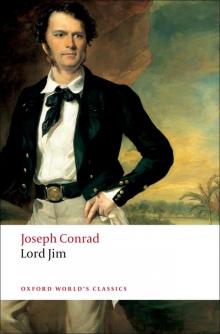 Lord Jim
Lord Jim The Nigger of the Narcissus (Echo Library)
The Nigger of the Narcissus (Echo Library) Victory (Dover Thrift Editions)
Victory (Dover Thrift Editions) Secret Agent
Secret Agent Nostromo
Nostromo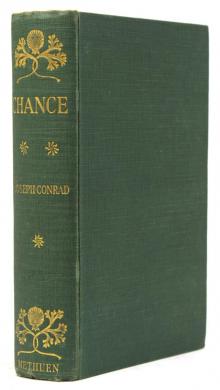 Chance: A Tale in Two Parts
Chance: A Tale in Two Parts Youth
Youth Almayer's Folly
Almayer's Folly The Heart of Darkness and the Secret Sharer
The Heart of Darkness and the Secret Sharer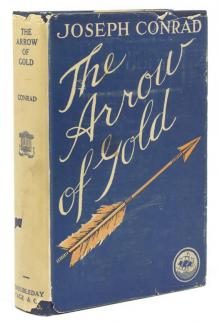 The Arrow of Gold: A Story Between Two Notes
The Arrow of Gold: A Story Between Two Notes The Rescue: A Romance of the Shallows
The Rescue: A Romance of the Shallows The Point Of Honor: A Military Tale
The Point Of Honor: A Military Tale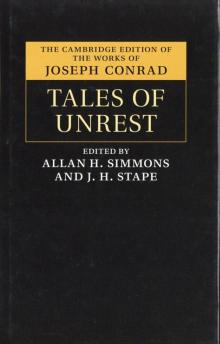 Tales of Unrest
Tales of Unrest Under Western Eyes
Under Western Eyes Gaspar Ruiz
Gaspar Ruiz A Set of Six
A Set of Six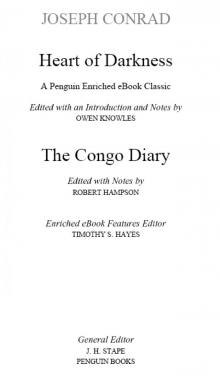 Heart of Darkness and the Congo Diary (Penguin Classics)
Heart of Darkness and the Congo Diary (Penguin Classics) Heart of Darkness and Selected Short Fiction
Heart of Darkness and Selected Short Fiction Typhoon
Typhoon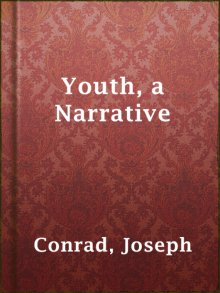 Youth, a Narrative
Youth, a Narrative Tomorrow
Tomorrow The Arrow of Gold
The Arrow of Gold The Shadow Line: A Confession
The Shadow Line: A Confession The Rescue
The Rescue Victory (Echo Library)
Victory (Echo Library) The Brute
The Brute Romance
Romance A Personal Record
A Personal Record Lord Jim: A Tale
Lord Jim: A Tale Heart of Darkness and Selected Short Fiction (Barnes & Noble Classics Series)
Heart of Darkness and Selected Short Fiction (Barnes & Noble Classics Series) Within the Tides
Within the Tides The Secret Sharer and Other Stories
The Secret Sharer and Other Stories Falk
Falk Heart of Darkness and The Secret Sharer
Heart of Darkness and The Secret Sharer Chance
Chance An Anarchist
An Anarchist The Secret Agent: A Simple Tale
The Secret Agent: A Simple Tale The Secret Agent
The Secret Agent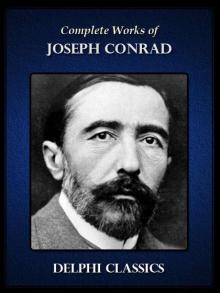 Complete Works of Joseph Conrad (Illustrated)
Complete Works of Joseph Conrad (Illustrated)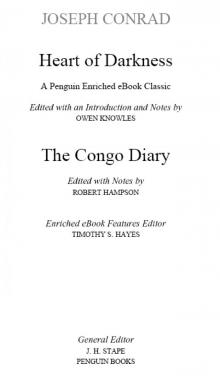 Heart of Darkness and the Congo Diary
Heart of Darkness and the Congo Diary Notes on Life & Letters
Notes on Life & Letters Typhoon (Single Story)
Typhoon (Single Story)